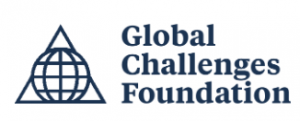New Shape Prize

We are delighted to announce the launch of the Global Challenges Prize 2017: A New Shape. This competition is a quest to find new models of global cooperation capable of handling global risks. It will award US$5 million in prizes for the best ideas that re-envision global governance for the 21st century.
Be part of the effort to safeguard our world for future generations. Be part of the global conversation. Help to change the shape of things to come.
The aim of the prize is to find models or frameworks for international cooperation, capable of addressing the interlinked risks and problems of climate change, other large-scale environmental damage, violent conflict (including nuclear and other weapons of mass destruction), extreme poverty, and expected continuing rapid population growth.
The competition is not looking for blueprints for solving the individual issues in question, or to avert specific risks. Rather, entrants should focus on designing a decision-making structure or framework that could galvanize effective international action to tackle these risks. The proposed model may encompass an entirely new global framework or a proposed reform for existing systems.
Who is the competition open to?
The prize competition is open to anyone - individuals, groups of individuals, universities, companies or associations - anywhere in the world. Every entry, however, requires one contact person for registration.
How do I enter?
Submissions should be no more than 9250 words. Entries can be submitted in English, Mandarin, Spanish, Russian, Arabic, and French. Multiple submissions are acceptable so long as they all address the prize’s criteria:
Contributions will be assessed based on how well they can be expected to meet the criteria listed below. In some cases, ensuring that certain criteria are met may make it harder to realize others. In such cases, trade-offs must be made. How well participants manage such trade-offs will be an important factor in the assessment. Good ideas on how to establish the governance model in reality will also be considered in the assessment.
1. Core Values.
Decisions within the governance model must be guided by the good of all humankind and by respect for the equal value of all human beings.
2. Decision-Making Capacity.
Decision-making within the governance model must generally be possible without crippling delays that prevent the challenges from being adequately addressed.
3. Effectiveness.
In order to effectively address the global challenges and risks, the governance model must include means to ensure implementation of decisions.
4. Resources and Financing.
The proposed governance model must have sufficient human and material resources at its disposal, and these resources must be financed in an equitable manner.
5. General Security.
The governance model must guarantee international security and prevent disputes from escalating into war or other large-scale armed violence. Nations and ethnic groups must be guaranteed protection from external attack and must receive assistance in handling internal disputes fairly.
6. Flexibility.
A successful governance model must allow revisions and improvements of its structure and components.
7. Accountability and Transparency.
It is a fundamental requirement of a successful governance model that it performs the tasks it has been charged with, and that decision-makers can be held accountable for their actions. This includes mechanisms against abuse of power, which can invalidate decisions and actions that exceed the mandate of the governance model, and which can step in when it is clear that decision-makers and relevant institutions are not doing their job correctly. This requires transparency and extensive insight into power structures and decision-making processes.
What do the winners receive?
The total sum of the prize fund, which will be distributed in its entirety, is US$5 million. The prize fund will be distributed amongst the short-listed contributions at the Foundation’s discretion. At least US$1 million will be awarded for the most distinguished entry or entries.
The prize allocation may also include smaller awards for particularly innovative entries that do not amount to an entire global framework but contain novel partial solutions, such as the composition of a specific decision-making body.
How do you decide the winner(s)?
Entries will be evaluated by a panel of academic experts followed by a high-level international jury of respected global figures. The jury will choose the final winners based on how well they meet the criteria.
What happens to the winning ideas?
The Foundation is committed to supporting the winning ideas, ultimately towards implementation. However, the precise support will be determined by the nature of those ideas.
Key Dates
From November 2016 until February 15 2017:
Participants will be asked to register their interest in participating in the Prize competition.
February 15, 2017:
Applications can be received.
May 24, 2017:
The final submission deadline.
May-August 2017:
All eligible and complete entries will be assessed by an Expert Academic Panel, a group of leading academics, working in relevant fields, all appointed by the Foundation.
August 2017:
A long list of selected entries will be presented to the Prize Competition Jury, who will review these entries and produce a short list.
October 2017:
Shortlisted candidates will be notified at the beginning of October and invited to a final judging day in Stockholm. Shortlisted participants will be asked to present their award entry on the judging day.
End of November 2017:
The final results of the competition are expected to be announced.
